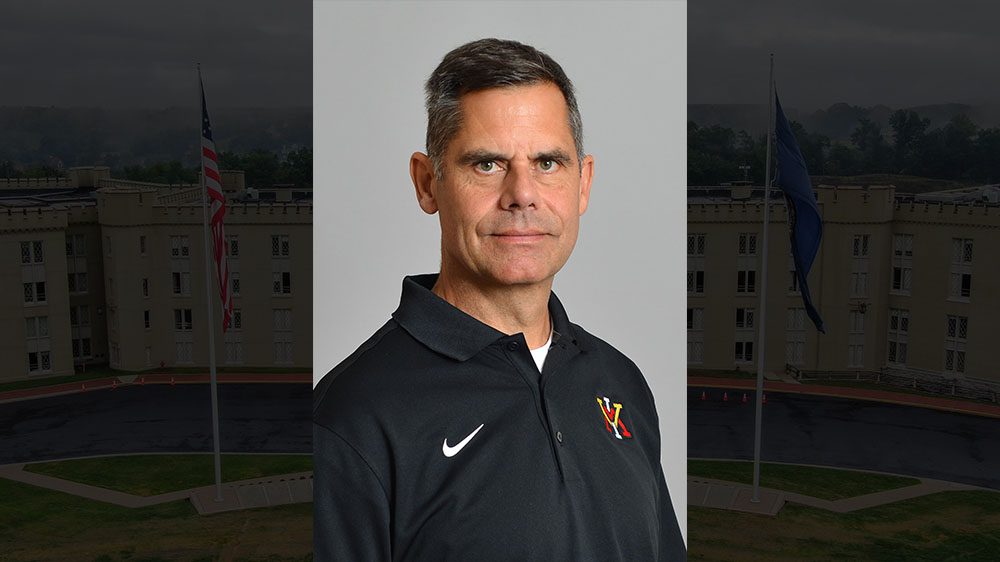VMI Welcomes New Emergency Manager

Retired Army National Guard Col. Paul Kastner, VMI’s new director of emergency management, most recently served as the chief of emergency response at the Pentagon.—Photo courtesy VMI Communications & Marketing.

Retired Army National Guard Col. Paul Kastner, VMI’s new director of emergency management, most recently served as the chief of emergency response at the Pentagon.—Photo courtesy VMI Communications & Marketing.
Retired Army National Guard Col. Paul Kastner has joined Virginia Military Institute as the new director of emergency management following the retirement of James L. “Jay” Williams Jr. ’83, former director.
Kastner, who has nearly 40 years of experience working in both the military and private sector, most recently served as the chief of emergency response at the Pentagon. He was responsible for protecting the Pentagon and all the associated facilities against chemical, biological, or radiological weapons, as well as high explosives. “The Pentagon is the most prestigious military headquarters in the world—bar none—and what we did had to be perfect. My staff always used to hear me say, ‘Good enough for government work does not cut it here,’” he stated.
Kastner received his bachelor’s degree in American history from Washington and Lee University and is very familiar with Lexington. His parents, who fell in love with the area while visiting him at W&L, bought a 50-acre cattle farm in Rockbridge County when they retired. “My parents are aging, and it was my intention to retire this year and move here to take care of them and the farm. I realized that perhaps there may be more I want to do with my time, so I looked on the VMI website for job opportunities. I saw this position posted and had an ‘eureka moment’—this is what I do,” he declared.
Though the Pentagon is quite different than VMI, Kastner explained that the fundamental preparation and planning for emergencies is basically the same. “Thinking scenarios through, making plans, and exercising those plans in advance is essential. That’s always been my training methodology, so when the bad day happens, we’re prepared,” he said.
Kastner stated that an emergency can be man-made or natural like floods, lightning strikes, and snowstorms. “A recent example of an emergency that affected VMI is the pandemic, COVID-19. An example of a man-made threat would be someone who, unfortunately, feels the need to act out in a violent way with a weapon or a vehicle. VMI has an open campus, which is a great thing. I love to see people coming here to walk their dogs, and stroll through post—and we want to maintain that—but it also provides access for someone who wants to do harm. Extreme events, though not very likely, have consequences that can be catastrophic, and therefore can’t be ignored,” he said.
According to Michael L. Marshall, VMI chief of police, the Office of Emergency Management is a critical division within the National Incident Management System and provides support in actual natural disasters, acts of terrorism, or other man-made disasters. “Emergency management and VMI police have supported each other on many different occasions during low-risk and high-risk situations on post. We’re very excited to work alongside Paul this academic year and for years to come,” he said.
Prior to working at the Pentagon, Kastner served in the Maryland National Guard. “One of my initial responsibilities was commander of the 32nd Civil Support Team, which was a weapons of mass destruction response unit for homeland security. I was moved into a position where I served as the senior full-time National Guard officer for military operational support and domestic contingency operations at the Maryland Emergency Management Agency,” he said.
Kastner earned a master’s degree in homeland security management from Towson University in Towson, Maryland.
Kastner’s wife, Amanda, currently works as a librarian for Baltimore County and is in the process of moving to Rockbridge County. The couple have four grown children, a Plott hound named Jessie, and a cat named Marco.
Editor's Note: Story originally published by Virginia Military Institute.